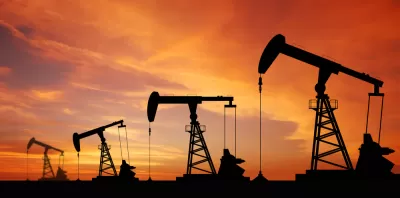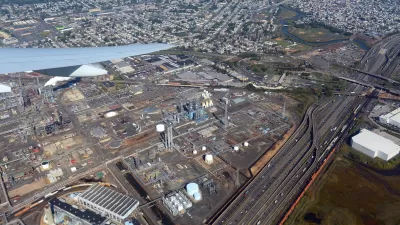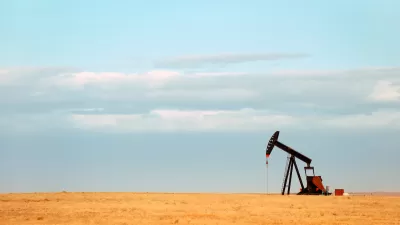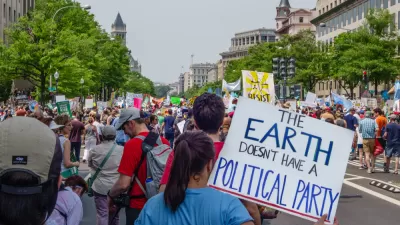Driven by foreign demand, a surge in West Texas oil production is having adverse effects on the local populace, and contributes to climate change at a crucial moment.

Given the grim IPCC climate change report that's been making the rounds lately, it's a special irony that in certain parts of the world, oil extraction is booming. West Texas is one of those places, report Kiah Collier, Jamie Smith Hopkins, and Rachel Leven.
They write, "What's happening is unprecedented. In December, companies in the Permian Basin — an ancient, oil-rich seabed that spans West Texas and southeastern New Mexico — were producing twice as much oil as they had four years earlier, during the last boom. Forecasters expect production to double again by 2023. Texas Gov. Greg Abbott and others say the drilling spree is ushering in a new era of American energy independence, but American demand isn't driving it. Foreign demand is."
The piece looks at some of the local pollution issues the industry is contributing to, and the state's patchy regulatory environment. "The U.S. just surpassed Russia as the world's top oil producer. The International Energy Agency predicts that American oil — most of it from the Permian — will account for 80 percent of the growth in global supply over the next seven years. That's bringing big profits to oil companies as well as lung-searing pollution to places where drilling has skyrocketed, while threatening to exacerbate climate change."
While the boom has brought profits and high wages to some, it's also wearing down local infrastructure and casting the region into the role of an "extraction colony" for the world's oil.
FULL STORY: As oil and gas exports surge, West Texas becomes the world’s “extraction colony”

Planetizen Federal Action Tracker
A weekly monitor of how Trump’s orders and actions are impacting planners and planning in America.

Maui's Vacation Rental Debate Turns Ugly
Verbal attacks, misinformation campaigns and fistfights plague a high-stakes debate to convert thousands of vacation rentals into long-term housing.

San Francisco Suspends Traffic Calming Amidst Record Deaths
Citing “a challenging fiscal landscape,” the city will cease the program on the heels of 42 traffic deaths, including 24 pedestrians.

Amtrak Rolls Out New Orleans to Alabama “Mardi Gras” Train
The new service will operate morning and evening departures between Mobile and New Orleans.

The Subversive Car-Free Guide to Trump's Great American Road Trip
Car-free ways to access Chicagoland’s best tourist attractions.

San Antonio and Austin are Fusing Into one Massive Megaregion
The region spanning the two central Texas cities is growing fast, posing challenges for local infrastructure and water supplies.
Urban Design for Planners 1: Software Tools
This six-course series explores essential urban design concepts using open source software and equips planners with the tools they need to participate fully in the urban design process.
Planning for Universal Design
Learn the tools for implementing Universal Design in planning regulations.
Heyer Gruel & Associates PA
JM Goldson LLC
Custer County Colorado
City of Camden Redevelopment Agency
City of Astoria
Transportation Research & Education Center (TREC) at Portland State University
Jefferson Parish Government
Camden Redevelopment Agency
City of Claremont





























